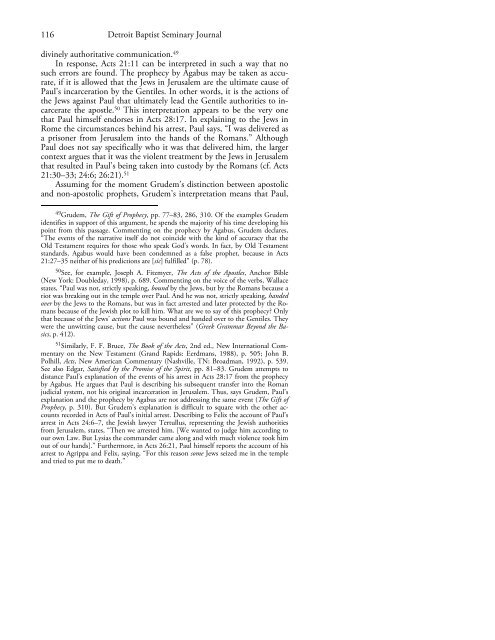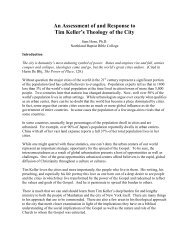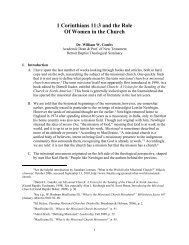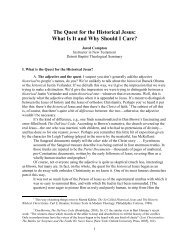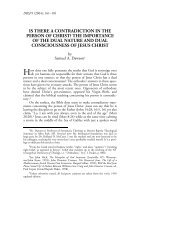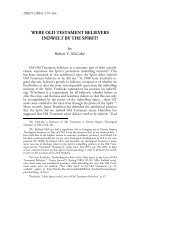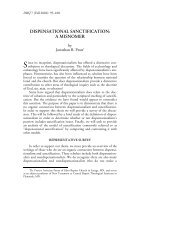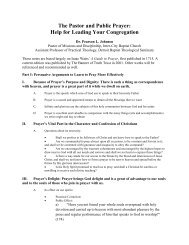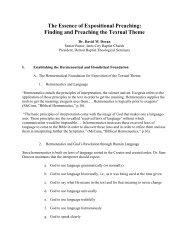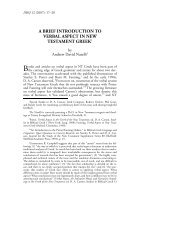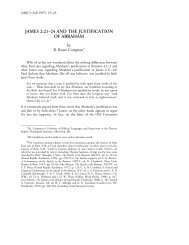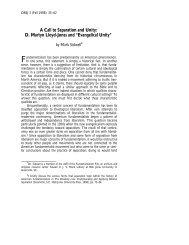1 Corinthians 13:8–13 and the Cessation of Miraculous Gifts
1 Corinthians 13:8–13 and the Cessation of Miraculous Gifts
1 Corinthians 13:8–13 and the Cessation of Miraculous Gifts
You also want an ePaper? Increase the reach of your titles
YUMPU automatically turns print PDFs into web optimized ePapers that Google loves.
116 Detroit Baptist Seminary Journaldivinely authoritative communication. 49In response, Acts 21:11 can be interpreted in such a way that nosuch errors are found. The prophecy by Agabus may be taken as accurate,if it is allowed that <strong>the</strong> Jews in Jerusalem are <strong>the</strong> ultimate cause <strong>of</strong>Paul’s incarceration by <strong>the</strong> Gentiles. In o<strong>the</strong>r words, it is <strong>the</strong> actions <strong>of</strong><strong>the</strong> Jews against Paul that ultimately lead <strong>the</strong> Gentile authorities to incarcerate<strong>the</strong> apostle. 50 This interpretation appears to be <strong>the</strong> very onethat Paul himself endorses in Acts 28:17. In explaining to <strong>the</strong> Jews inRome <strong>the</strong> circumstances behind his arrest, Paul says, “I was delivered asa prisoner from Jerusalem into <strong>the</strong> h<strong>and</strong>s <strong>of</strong> <strong>the</strong> Romans.” AlthoughPaul does not say specifically who it was that delivered him, <strong>the</strong> largercontext argues that it was <strong>the</strong> violent treatment by <strong>the</strong> Jews in Jerusalemthat resulted in Paul’s being taken into custody by <strong>the</strong> Romans (cf. Acts21:30–33; 24:6; 26:21). 51Assuming for <strong>the</strong> moment Grudem’s distinction between apostolic<strong>and</strong> non-apostolic prophets, Grudem’s interpretation means that Paul,49 Grudem, The Gift <strong>of</strong> Prophecy, pp. 77–83, 286, 310. Of <strong>the</strong> examples Grudemidentifies in support <strong>of</strong> this argument, he spends <strong>the</strong> majority <strong>of</strong> his time developing hispoint from this passage. Commenting on <strong>the</strong> prophecy by Agabus, Grudem declares,“The events <strong>of</strong> <strong>the</strong> narrative itself do not coincide with <strong>the</strong> kind <strong>of</strong> accuracy that <strong>the</strong>Old Testament requires for those who speak God’s words. In fact, by Old Testamentst<strong>and</strong>ards, Agabus would have been condemned as a false prophet, because in Acts21:27–35 nei<strong>the</strong>r <strong>of</strong> his predictions are [sic] fulfilled” (p. 78).50 See, for example, Joseph A. Fitzmyer, The Acts <strong>of</strong> <strong>the</strong> Apostles, Anchor Bible(New York: Doubleday, 1998), p. 689. Commenting on <strong>the</strong> voice <strong>of</strong> <strong>the</strong> verbs, Wallacestates, “Paul was not, strictly speaking, bound by <strong>the</strong> Jews, but by <strong>the</strong> Romans because ariot was breaking out in <strong>the</strong> temple over Paul. And he was not, strictly speaking, h<strong>and</strong>edover by <strong>the</strong> Jews to <strong>the</strong> Romans, but was in fact arrested <strong>and</strong> later protected by <strong>the</strong> Romansbecause <strong>of</strong> <strong>the</strong> Jewish plot to kill him. What are we to say <strong>of</strong> this prophecy? Onlythat because <strong>of</strong> <strong>the</strong> Jews’ actions Paul was bound <strong>and</strong> h<strong>and</strong>ed over to <strong>the</strong> Gentiles. Theywere <strong>the</strong> unwitting cause, but <strong>the</strong> cause never<strong>the</strong>less” (Greek Grammar Beyond <strong>the</strong> Basics,p. 412).51 Similarly, F. F. Bruce, The Book <strong>of</strong> <strong>the</strong> Acts, 2nd ed., New International Commentaryon <strong>the</strong> New Testament (Gr<strong>and</strong> Rapids: Eerdmans, 1988), p. 505; John B.Polhill, Acts, New American Commentary (Nashville, TN: Broadman, 1992), p. 539.See also Edgar, Satisfied by <strong>the</strong> Promise <strong>of</strong> <strong>the</strong> Spirit, pp. 81–83. Grudem attempts todistance Paul’s explanation <strong>of</strong> <strong>the</strong> events <strong>of</strong> his arrest in Acts 28:17 from <strong>the</strong> prophecyby Agabus. He argues that Paul is describing his subsequent transfer into <strong>the</strong> Romanjudicial system, not his original incarceration in Jerusalem. Thus, says Grudem, Paul’sexplanation <strong>and</strong> <strong>the</strong> prophecy by Agabus are not addressing <strong>the</strong> same event (The Gift <strong>of</strong>Prophecy, p. 310). But Grudem’s explanation is difficult to square with <strong>the</strong> o<strong>the</strong>r accountsrecorded in Acts <strong>of</strong> Paul’s initial arrest. Describing to Felix <strong>the</strong> account <strong>of</strong> Paul’sarrest in Acts 24:6–7, <strong>the</strong> Jewish lawyer Tertullus, representing <strong>the</strong> Jewish authoritiesfrom Jerusalem, states, “Then we arrested him. [We wanted to judge him according toour own Law. But Lysias <strong>the</strong> comm<strong>and</strong>er came along <strong>and</strong> with much violence took himout <strong>of</strong> our h<strong>and</strong>s].” Fur<strong>the</strong>rmore, in Acts 26:21, Paul himself reports <strong>the</strong> account <strong>of</strong> hisarrest to Agrippa <strong>and</strong> Felix, saying, “For this reason some Jews seized me in <strong>the</strong> temple<strong>and</strong> tried to put me to death.”


